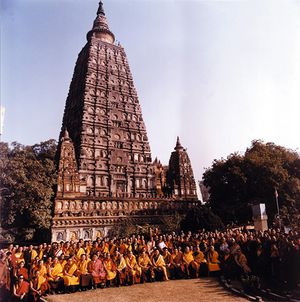Bodhgaya: Difference between revisions
No edit summary |
No edit summary |
||
| Line 1: | Line 1: | ||
[[Image:Monlam97group.jpg|thumb|[[Nyingma|Nyingmapa]] masters in front of the [[Mahabodhi stupa]] at the Mönlam Chenmo prayer festival, Bodhgaya, 1996.]] | [[Image:Monlam97group.jpg|thumb|[[Nyingma|Nyingmapa]] masters in front of the [[Mahabodhi stupa]] at the Mönlam Chenmo prayer festival, Bodhgaya, 1996.]] | ||
'''Bodhgaya''' (Skt. ''bodh gayā''), near the city of Gaya in the Indian state of Bihar, is the village that was built around the [[Vajra Seat]]. By the [[bodhi tree]] near the [[Vajrasana]] is the main [[stupa]], which is called [[Mahabodhi]], surrounded by numerous smaller [[chaitya]]s. At the time of the Muslim invasions in the 13th century the site was abandoned to the jungle, with the result that it survived the massive destruction which befell other Buddhist sites and is preserved today. The Archaeological Museum also houses many relics. The site is flooded with Tibetans each year from November to February, when, unlike during the rest of the year, it is not unbearably hot. Since 1987, the [[Nyingma Mönlam Chenmo]] has been held in Bodhgaya every year during the first ten days of the 12th Tibetan month. | '''Bodhgaya''' (Skt. ''bodh gayā''), near the city of Gaya in the Indian state of Bihar, is the village that was built around the [[Vajra Seat]]. By the [[bodhi tree]] near the [[Vajrasana]] is the main [[stupa]], which is called [[Mahabodhi]], surrounded by numerous smaller [[chaitya]]s. At the time of the Muslim invasions in the 13th century the site was abandoned to the jungle, with the result that it survived the massive destruction which befell other Buddhist sites and is preserved today. The Archaeological Museum also houses many relics. The site is flooded with Tibetans each year from November to February, when, unlike during the rest of the year, it is not unbearably hot. Since 1987, the [[Nyingma Mönlam Chenmo]] has been held in Bodhgaya every year during the first ten days of the 12th Tibetan month. | ||
==History== | |||
===Tibetans in Bodhgaya=== | |||
[[Chak Lotsawa]] spent eleven years in Magadha from 1232 to 1241, mainly in Bodhgaya and Nalanda, as the sacred sites were in the process of being destroyed. His story is well known, especially through Roerich's translation of his biography, but Vitali (2010) has described how at least seven other Tibetan masters during the same period. [[Chomden Rigpé Raldri]] (1228-1305) composed a guide to Bodhgaya, but it is unclear whether he actually visited the site. | |||
==Further Reading== | ==Further Reading== | ||
===In Tibetan=== | ===In Tibetan=== | ||
*[[Chomden Rigpé Raldri]], ''rdo rje gdan rnam bshad rgyan gyi me tog'' | *[[Chomden Rigpé Raldri]], ''rdo rje gdan rnam bshad rgyan gyi me tog'' | ||
===In English=== | ===In English=== | ||
*Ahir, D. C. ''Buddha Gaya through the Ages''. Delhi: Sri Satguru, 1994. | *Ahir, D. C. ''Buddha Gaya through the Ages''. Delhi: Sri Satguru, 1994. | ||
| Line 12: | Line 17: | ||
*Bhattacharyya, Tarapada. ''The Bodhgaya Temple''. Calcutta:Firma K. L. Mukhopadhyah, 1966. | *Bhattacharyya, Tarapada. ''The Bodhgaya Temple''. Calcutta:Firma K. L. Mukhopadhyah, 1966. | ||
*Leoshko, Janice, ed. ''Bodhgaya: The Site of Enlightenment''. Bombay: Marg, 1988. | *Leoshko, Janice, ed. ''Bodhgaya: The Site of Enlightenment''. Bombay: Marg, 1988. | ||
*Roerich, George. ''Biography of Dharmasvāmin (Chag lo tsa-ba Chos-rje dpal)'', Patna: K.P Jayaswal Research Institute, 1959 | |||
*Vitali, Roberto. 'In the Presence of the "Diamond Throne": Tibetans at rDo rje gdan (Last Quarter of the 12th Century to Year 1300)' in ''Tibet Journal: The Earth Ox Papers'', Ed. Roberto Vitali, 2010. | |||
==Internal Links== | ==Internal Links== | ||
Revision as of 07:20, 4 February 2011

Bodhgaya (Skt. bodh gayā), near the city of Gaya in the Indian state of Bihar, is the village that was built around the Vajra Seat. By the bodhi tree near the Vajrasana is the main stupa, which is called Mahabodhi, surrounded by numerous smaller chaityas. At the time of the Muslim invasions in the 13th century the site was abandoned to the jungle, with the result that it survived the massive destruction which befell other Buddhist sites and is preserved today. The Archaeological Museum also houses many relics. The site is flooded with Tibetans each year from November to February, when, unlike during the rest of the year, it is not unbearably hot. Since 1987, the Nyingma Mönlam Chenmo has been held in Bodhgaya every year during the first ten days of the 12th Tibetan month.
History
Tibetans in Bodhgaya
Chak Lotsawa spent eleven years in Magadha from 1232 to 1241, mainly in Bodhgaya and Nalanda, as the sacred sites were in the process of being destroyed. His story is well known, especially through Roerich's translation of his biography, but Vitali (2010) has described how at least seven other Tibetan masters during the same period. Chomden Rigpé Raldri (1228-1305) composed a guide to Bodhgaya, but it is unclear whether he actually visited the site.
Further Reading
In Tibetan
- Chomden Rigpé Raldri, rdo rje gdan rnam bshad rgyan gyi me tog
In English
- Ahir, D. C. Buddha Gaya through the Ages. Delhi: Sri Satguru, 1994.
- Allen, Charkes. The Buddha and the Sahibs. John Murray, 2002.
- Barua, Benimadhab. Gaya and Buddha-Gaya, Vol. 1: Early History of the Holy Land (1931). Varanasi, India: Bhartiya, 1975.
- Barua, Dipak Kumar. Buddha Gaya Temple: Its History. Buddha Gaya, India: Buddha Gaya Temple Management Committee,1975. Second revised edition, 1981.
- Bhattacharyya, Tarapada. The Bodhgaya Temple. Calcutta:Firma K. L. Mukhopadhyah, 1966.
- Leoshko, Janice, ed. Bodhgaya: The Site of Enlightenment. Bombay: Marg, 1988.
- Roerich, George. Biography of Dharmasvāmin (Chag lo tsa-ba Chos-rje dpal), Patna: K.P Jayaswal Research Institute, 1959
- Vitali, Roberto. 'In the Presence of the "Diamond Throne": Tibetans at rDo rje gdan (Last Quarter of the 12th Century to Year 1300)' in Tibet Journal: The Earth Ox Papers, Ed. Roberto Vitali, 2010.